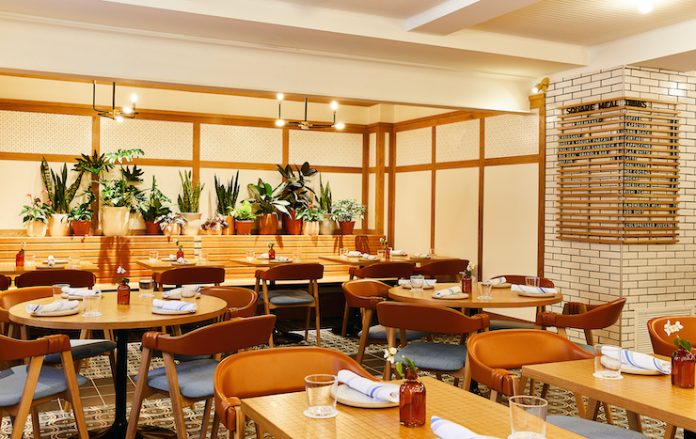
As businesses around the country close their doors in response to the COVID-19 pandemic, Hotel Revival Baltimore, a Joie de Vivre Hotel, is asking how the property can best serve its community at this time. The hotel and its partners have responded to the city’s needs with a variety of initiatives, including distributing free brown-bag lunches and offering its first-floor restaurant space to local vendors in need of a place to operate takeout businesses.
“It was really always a conversation of, what’s the best thing that we could be doing right now,” says Donte Johnson, general manager of Hotel Revival. “Every branch of the Revival tree, from a stakeholder perspective, is really focused on care and community—whether that’s Hyatt, whether that’s ownership, whether that’s the team at the hotel, specifically. There’s a massive overlap where we’re all really centered and focused on providing care and support to our community.”
Before COVID-19 completely changed the world in a matter of weeks, social impact programming was already a focus of Hotel Revival’s. Working with its programming partner, the marketing agency Kiss Tomorrow Hello, the hotel hosted weekly programming for Black History Month in February and planned to host programming focused on mental health each week in March. When it became clear the community’s needs had shifted as a result of the mounting COVID-19 crisis, the hotel changed course.
“Whatever sense of normalcy you can retain in this environment has an intrinsic value that goes beyond your P&L statement.”
“We were trying to figure out what the next evolution of that looks like,” Johnson explains. Together, they identified a need among local vendors for space to continue their operations during the statewide nonessential business shutdown. “With restaurants closing in all of the various markets in Baltimore, you’ve got a lot of operators who’ve become staples in the community who can no longer operate at all, so they don’t have the luxury that many of us have to just make a pivot towards grab-and-go and delivery options,” Johnson says.
Hotel Revival put out a call on social media offering free pop-up space to local small food vendors in its downstairs restaurant known as Square Meal, which is adjacent to a valet drive that could be used for curbside pickup and deliveries. Johnson says they received dozens of responses on the first day. So far, the space has hosted the Rum Cake Kitchen, a local bakery business owned by Audrey Watson, and The Charmery, an ice cream shop owned by husband and wife team David and Laura Alima.
Johnson says that while hospitality businesses that continue to operate through this crisis may not be able to maintain sales at the same level, they are able to continue connecting with customers and possibly keep some employee hours.
“If that’s another cook who gets to show up to work and make some money to feed their family, then great,” Johnson says. “I think for a lot of these businesses, you are not going to make the same money that you would in the location where you built your following, and I think people get that, but I also believe that whatever sense of normalcy you can retain in this environment has an intrinsic value that goes beyond your P&L statement.”
In addition to offering restaurant space for pop-ups, Hotel Revival has put resources towards feeding its community directly. With partners including Hungry Harvest and Coastal Sunbelt Produce, the hotel has delivered fruits and vegetables to those in need, provided care packages to hospitality workers who have been laid off, and given out hundreds of brown-bag lunches to people in the community. “For us, it’s an amazing thing to be able to do just a small part of the work to keep people afloat,” Johnson says.
For hotel owners, operators, and GMs with the resources to help their communities at this time, Johnson advises starting a conversation between the property and its partners. “My recommendation would be to reach out to everyone that you’ve partnered with throughout the course of the year during your normal operations and just get a sense of how they can give back,” Johnson says. “For us, that’s a part of the value proposition. If you’re someone who we as a business have spent money with and done business with, then when our mission becomes to give back to the community, our expectation is that you’re aligned with that. And if you have the resources and the capacity to support, then you do that. I think having that conversation and being very upfront about that and what you’re trying to do will yield unexpected results.”
For instance, Hotel Revival has received unplanned donations from partners and people in the community who heard about its initiatives, which the hotel has shared on social media. “I think pushing out the desire to support is the first step. Figuring out what resources you have available and are able to commit is the second step,” Johnson says. “We’re fortunate that our ownership group is very keen on the idea of supporting the community. When we talked about what we were able to secure from a donation perspective, and our desire to get some meals out to people, they were very enthusiastic about contributing resources to that. So that’s a luxury that we have that a lot of hotels might not.”
“But I would bet that if you reach out to the folks that you’re buying food from and tell them that you want to make some brown bag lunches for people who are in need, that they’ll be keen on the idea,” he adds.











